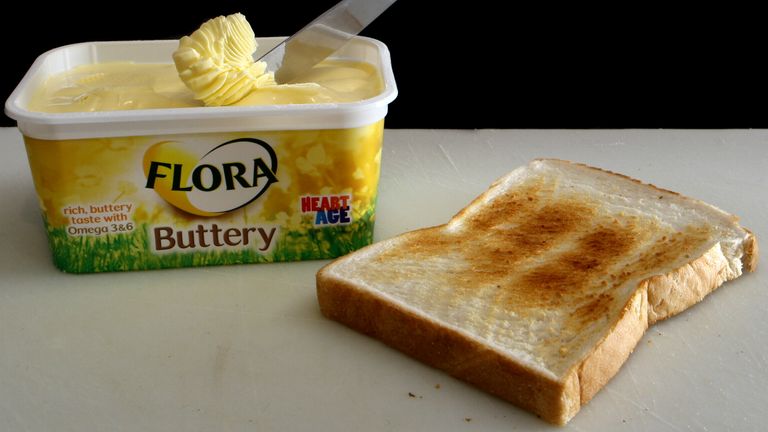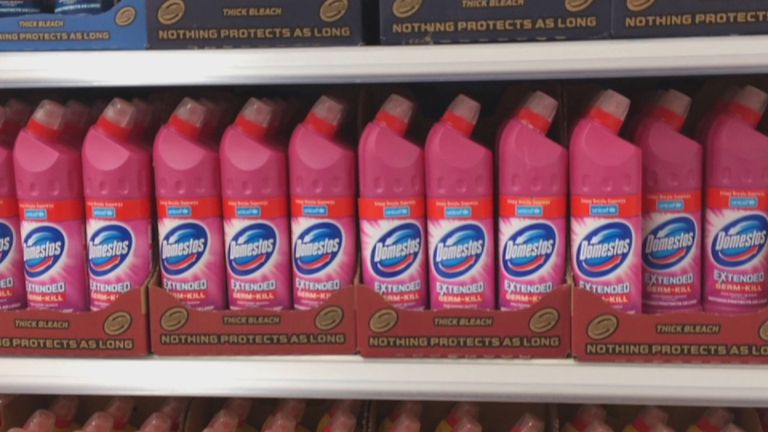Unilever progress allows focus to fall on a single HQ
Sky's Ian King charts the progress on driving value for shareholders at Unilever but warns a tough decision on jobs is looming.
Thursday 1 February 2018 14:20, UK
Just under a year ago Unilever, one of the most revered names in British business, received an unwanted communication.
The US food giant Kraft-Heinz, backed by billionaire investor Warren Buffett and Jorge Lemann, Brazil's richest man, wanted to buy the company for £115bn.
Unilever, with brands include Persil washing powder, Magnum ice cream, PG Tips tea, Marmite and Dove soap, managed to repel the bid approach inside 48 hours.
But the attentions of a company with a management notorious for its price-cutting - and, some would say, asset-stripping - was nonetheless an enormous shock.
For some investors, the majority of whom were as shocked as Unilever's management, it pointed to a degree of complacency at the company.
Once the shock had died down, Unilever responded with some radical surgery, most notably the $8bn sale in December of its misfiring spreads business - which includes Flora and I Can't Believe It's Not Butter - to KKR, the US private equity giant.
it also promised to adopt the so-called "zero-based budgeting" approach, in which every part of a business effectively starts with a budget of zero at the beginning of each financial period, forcing them to justify every expense.
Profit targets were cranked up, a €5bn share buy-back was announced and a reorganisation unveiled under which the company's food and refreshments divisions would be combined.
The measures delighted investors and, by the middle of October, shares of Unilever were trading at north of £45 each, compared with the £33 or so at which they were changing hands prior to the Kraft-Heinz approach.
Then came a disappointing trading update, blamed on poor weather in Europe and hurricanes in the US, sending the shares rattling back all the way to £40, a level at which they have since remained.
So there was plenty riding on today's full year results for 2017. Could Unilever provide evidence of a step-change in performance following the shake-up announced last year?
The answer appears to be yes. While underlying sales growth for the full year was 3.1%, during the final three months of the year it was a better-than-expected 4%, rising to 4.3% if the spreads business, being sold, is excluded.
And, crucially, profit margins - the area where any improvement in performance as a result of operational changes would expect to show up - also rose. Underlying operating margin, the best guide to this, rose by 110 basis points.
In other words, for every £1 worth of sales, Unilever is extracting an extra 1.1p worth of profit. The company now enjoys a margin of 17.5p in every £1 - putting it well on course, at the current rate of improvement, to hit the 20p it is targeting by 2020.
Paul Polman, chief executive, could point out that, with €6bn worth of cost savings targeted by 2020, the company is already past €2bn and ahead of schedule.
Moreover, the controversial zero-based budgeting approach also appears to be paying off, with Mr Polman insisting today that Unilever is now getting much better value from its advertising and marketing - a major overhead for the company - as a result of this more disciplined approach. Headline pre-tax profits rose by 9.2% to €8.2bn.
So, with both sales up and margins improving, progress is undeniably being made. Strong performances from the fabric conditioner Comfort and the food brands Knorr and Hellmann's were all highlighted by Mr Polman.
It is always worth remembering that Unilever makes three-fifths of its sales from emerging markets and, as one illustration of that, it could point out today that its Brooke Bond tea brand has become the market leader in India.
There were, though, a couple of things missing from today's update.
As Sky's City Editor Mark Kleinman revealed in November, the company has now begun a search for Mr Polman's successor, but there was no news on that today.
The other, probably more serious in terms of UK jobs, is that, following the trauma of the Kraft-Heinz approach, the company said it was looking into doing away with the dual-listing arrangement it has.
This set-up - Unilever plc listed in London and Unilever NV listed in Amsterdam - has existed since the British soap manufacturer Lever Brothers merged with the Dutch margarine maker Naamlooze Vennootschap Margarine Unie in 1930.
It is a costly and complex arrangement, requiring two boards - albeit with the same directors on each - head offices, shareholder bases and two annual meetings, not to mention two sets of accounts.
Although the business has always functioned as a single economic entity, formalising that with a single company registered in one place would be logical, although painful for whichever country lost out.
All the signals have been that the Dutch will win this battle. An announcement was widely expected today.
The fact there has not been one suggests Britain is putting up a strong fight to keep this vital business based here.







